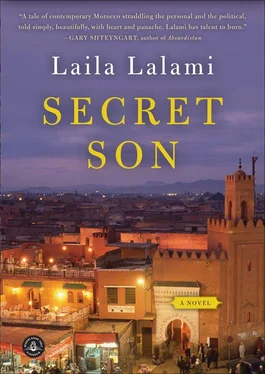Looking down, he dropped his bag on the floor. She gave him a hug, her head barely reaching his chest. “My son, my son.”
After she let go of him, he remained standing in the same spot until she guided him by the hand toward the divan and forced him to sit. She did not ask him the questions he expected — Did he throw you out? What about your school? What about the job? — but instead sat next to him in a silence that resonated with solidarity.
Youssef’s throat was dry. His jaw was so tight that he was unable to speak. He stared at her, and after a while she put her hand on his forehead, then caressed his cheek. He watched her, still immobile. She asked if he was hungry. He did not answer. “Do you want to go lie down, then?” He managed to blink his approval.
She helped him to his bed. He tucked his knees to his chest and turned to face the wall. Chills ran down his arms and legs, despite the blanket with which his mother had covered him. He heard her turn off the TV out in the yard before returning to the bedroom to sit on her bed. As darkness fell, the house grew quieter. He could hear her breathing across the room. He closed his eyes, though he knew there would be no sleep for him tonight.

Youssef did not leave his mother’s house over the next few days. Although he was due to sit for his final exams, he could not bring himself to go to school. He did little but sleep or stare at the ceiling — counting the dips in the corrugated tin above him, and then counting them again until he fell asleep. He wanted never to wake up. What purpose was there to his existence? If his mother had aborted him, he would have escaped the life that she had condemned herself to, and he would not have had to endure the fate that had been decided for him even before he was born. His anger took many shapes: sometimes it was soft and familiar, like a round stone that he had caressed for so long that it was perfectly smooth and polished; sometimes it was thin and sharp, like a blade that could slice through anything; sometimes it had the form of a star, radiating his hatred in all directions, leaving him numb and empty inside.
When the end of the month finally arrived, he called his father. The line rang, but no one answered. Rather than leave a message, he hung up. Now he had to contend with the doubts: Had his father ignored his call, the way he used to ignore his wife’s? There was no other alternative but to go meet him at work. Youssef put on his nicest shirt, a pair of black pants, and the tasseled loafers he had bought from a store on rue Aïn Harrouda. He ran up the street like a fugitive and caught a bus to the west side of town. It was still early. His father was probably making his morning calls and getting ready to go out for his rounds — to the factory, the hotel, a trade conference, or a business meeting. With enough luck, Youssef might still catch him.
The sun was already high in the sky when Youssef arrived at AmraCo. The mirrored windows reflected the rays of light, blinding him. He reached for his sunglasses, then suddenly remembered that he no longer had them; they had been left behind in the apartment. With eyes cast down, he walked inside the parking lot and stood by the entrance, waiting for his father to emerge. Cars and cabs fought for space at the semaphore across the street, starting up in a cloud of dark exhaust as the light turned green. A policeman whistled at a motorcycle and then spoke into his walkie-talkie when the driver failed to stop. A truck stopped by the minimarket up the street and delivered canisters of gas. It was scorching hot, and Youssef could feel pearls of sweat forming on his forehead.
Finally the double doors swung open and Omar the driver came out, followed by Nabil Amrani. Youssef held out the hope that somewhere in his father’s appearance, there would be a hint of Youssef’s passage in his life. But Nabil looked exactly the same as ever: harried, elegant, authoritative, in control. Nothing about him hinted at the events that had come to pass.
Omar saw Youssef first. He calmly left the door he held open for his boss, went around to his side of the car, and climbed in. Youssef walked up, standing now face-to-face with his father. “Youssef! What are you doing here?” Nabil asked. He sounded genuinely surprised.
“I came to see you.”
Nabil’s gaze shifted. “I’m sorry about what happened. My wife and my daughter found out … it’s complicated.”
“Weren’t you going to tell them? Why would it be complicated?”
“You wouldn’t understand,” Nabil said wearily. Then he reached out and touched Youssef’s arm. It amazed Youssef how much and how often both of his parents underestimated his capacity to understand. He did understand. A small part of him had known, all along, that his dream of a real-life father was impossible, but he had wanted to turn the impossibility into a possibility. Why could they not understand that?
“So this is it?” Youssef asked his father. “You don’t want to see me anymore?” There was a touch of threat in his tone; he did not know from where it came.
“No, that’s not it. I do want to see you. But right now is not the best time.” He looked up at the building, as if afraid of being caught. “I am still trying to see if we can reach a compromise. Please be patient.”
Promises, again. Youssef was ready for them, though, the way a traveler in the desert cannot discount assurances of an oasis up ahead; it was better than continuing forth without hope of relief. “Where have you been this whole time?” he asked, his voice softening.
“I was in Los Angeles until mid-June, and then in Spain, and now I have so much work to catch up on, I haven’t been able to handle this. But I will.” He let his hand rest on Youssef’s shoulder once again. “Okay?” He got into the car, closing the door. Youssef jammed his fists into his trouser pockets and stood aside, watching the car ease its way out of the parking lot.
For the first time, Youssef could see why Nabil Amrani never seemed to get emotional when they watched sad movies together in the apartment, or why he never seemed to get angry when he heard news of the war on the radio. The world was the way it was; Nabil Amrani took it as it came and did not think about anything else besides his own existence. Someday, Youssef knew, his father would come to see that life could not be lived like this, that the wider universe had a way of intruding upon people’s private world.
TWO WEEKS WENT BY, but there was no word from Nabil Amrani. No matter how often Youssef played images of a future with his father in his mind, he could not bring himself to believe in them anymore. He called his father’s mobile phone repeatedly, but his father never picked up. He tried him at the office, but the secretary said he could not come to the phone, and to please stop calling. He even went to the office, but the security guards would not let him go upstairs.
He came to understand that his father had made a choice. Amal was his real child; Youssef was the bastard. He belonged here with all the other young men no one talked about, except every few years when there was a natural catastrophe, a terrorist attack, or a legislative election. He had grown up in Hay An Najat, away from the eyes of the world, and now he became convinced that it would be his grave, too.
AT FIRST, HIS MOTHER did not ask Youssef why he spent most of his days in bed, staring at the ceiling, but once it became clear his father would not call, the questions began. “Why don’t you shave?” she asked. She stripped her bed of sheets and blankets and took them outside to hang in the sun.
Читать дальше













